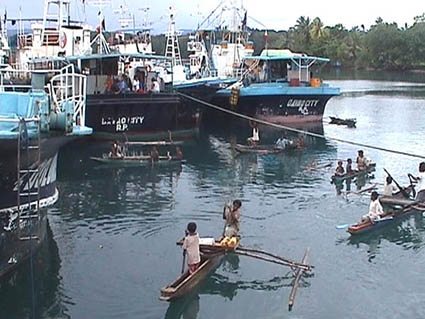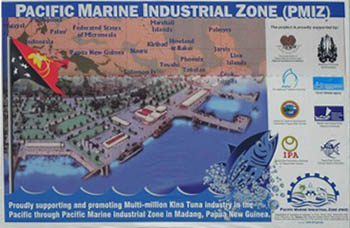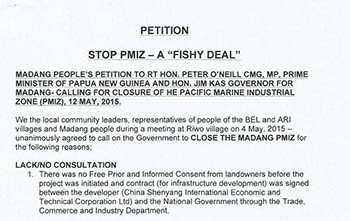
Nancy Sullivan
MADANG (Pacific Media Watch): The Pacific Marine Industrial Zone (PMIZ) in Papua New Guinea has become a national controversy in this northern coastal town of Madang as grassroots opposition mounts against the plans.
The proposed industrial zone would be the largest tuna landing and processing hub in the southern hemisphere, housing up to ten canneries and other industrial plants, in a former colonial plantation just north of Madang.
This has been spearheaded by the National Fisheries Authority and the Ministry of Commerce and Industry, and in 2007 they received the first US$95 million of a series of loans from China’s Export Import Bank for its development. But little construction has actually occurred, beyond raising a gate and a razorwire fence around the zone.
But little construction has actually occurred, beyond raising a gate and a razorwire fence around the zone.
At the same time, a groundswell of grassroots resistance has been building.
Last week it came to a head when the Department of Trade, Commerce and Industry tried to gag some of the PMIZ’s most vocal opponents.
These include the MP for Sumkar, Ken Fairweather, whose constituency is within the zone; Dorothy Tekwie, a prominent conservationist; eight local landowners who have spoken out against the project in the past; and me.
The department has been issued a summons restraining us from visiting the site, organising meetings about, or in any other way publicly objecting to the PMIZ.
Going to trial
On June 22 nine of these defendants appeared in court to face the government, and insist that the case go to trial.
Justice David Cannings granted their motion for July 21, and three of those defendants simultaneously submitted Human Rights Enforcement Applications to the court regarding these breaches to free expression, conscience, assembly, information and movement.
They have also reached out to international human rights lawyers for advice, and reissued a petition against the PMIZ that garnered 5000 signatures in Madang within 48 hours.
This comes at a difficult time for Papua New Guinea’s Prime Minister, Peter O’Neill, who is facing his own courtroom dramas over alleged corruption, and whose own lawyer is facing media scrutiny for hidden camera discussions about money laundering in Australia. The project has never been made explicit to the people of Madang, although communities have been told their offshore islands may be blasted to expand the harbour. What will happen to the subsistence fishing lifestyle of thousands of villagers?
The project has never been made explicit to the people of Madang, although communities have been told their offshore islands may be blasted to expand the harbour. What will happen to the subsistence fishing lifestyle of thousands of villagers?
Conservationists are alarmed that any plan to industrialise the Madang Lagoon area - world renowned for its marine biodiversity and home to five Wildlife Management Areas- - has even been raised.
This "fishy deal" raises serious questions about national development policy and the rights of local landowners to determine their own future, not to mention the spectre of Chinese investment in the province.
China already owns a nickel mine in the province, and it is said that the "jobs" being promised by the PMIZ - where up to 100,000 people will live and work - will be earmarked for Chinese nationals.
Nancy Sullivan, a resident anthropologist and tuna expert, is among the critics of the plan.
More background
The Stop PMIZ people's petition
This work is licensed under a Creative Commons Attribution-NonCommercial 3.0 New Zealand Licence.




